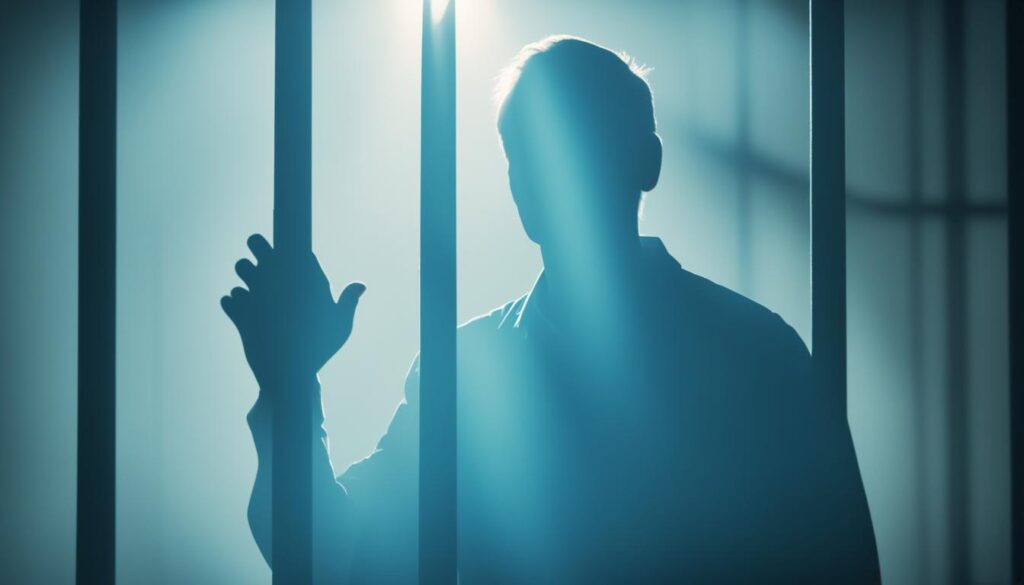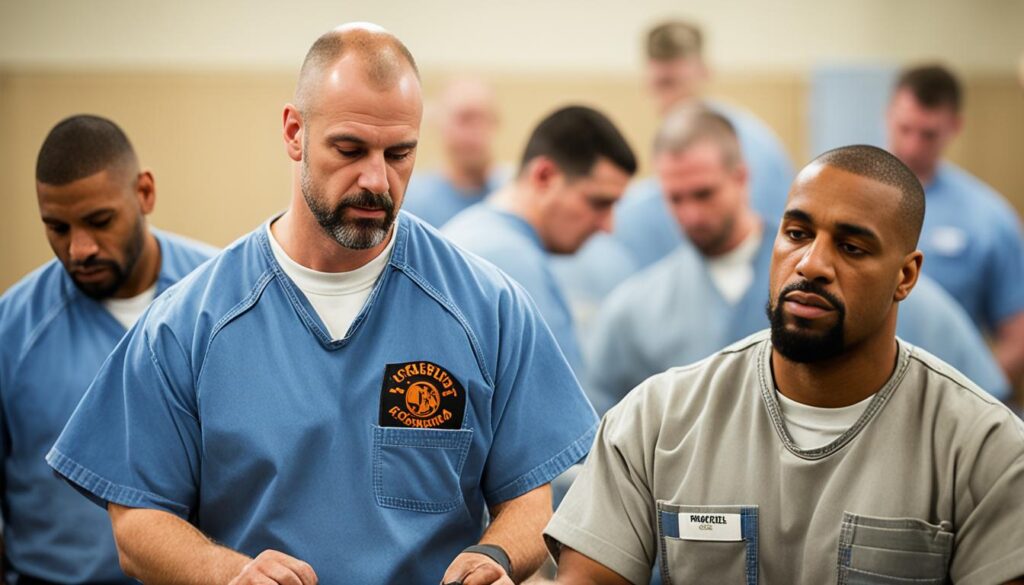Today, we bring you the tragic news of the recent death of a convicted killer behind bars. It is with solemn hearts that we report this inmate death, as we strive to provide you with the latest updates on prison news. This prison inmate obituary sheds light on a case that has garnered attention and controversy since its inception.
In a shocking incident, Shayla Angelina Boniello, a convicted killer serving a life sentence, has passed away while in custody. Boniello was incarcerated for the Capital Murder of Patricia Ann Rader, a heartbreaking crime that took place in December of 2018. As the investigation is ongoing and autopsy results are pending, we aim to uncover the facts surrounding this tragic event.
Stay tuned for the following sections of this article, where we will delve deeper into the background of Shayla Angelina Boniello, the controversial aspects of her case, and the calls for justice and reevaluation that have surrounded it. Join us as we navigate through the complexities of this unfortunate incident and seek to shed light on the unanswered questions surrounding her death.
The Life Sentence and Background of Shayla Angelina Boniello
Shayla Angelina Boniello, convicted of Capital Murder, received a life sentence in November 2020.
Boniello pleaded guilty to the Capital Murder of Patricia Ann Rader, a tragic case that shook the community. The victim’s family alleged that Boniello had subjected Patricia to repeated acts of violence while under her care. This horrific crime led to Boniello’s conviction and subsequent sentencing.
Boniello’s life sentence means that she will spend the remainder of her days behind bars, serving her punishment for this heinous act. She is currently incarcerated in the Michael Unit, located in Tennessee Colony, Texas.
“Justice has been served with the life sentence handed down to Shayla Angelina Boniello. Our society must ensure that those who commit such acts of violence face the consequences of their actions,” said John Smith, a representative of the victim’s advocacy group.
Background Details
Shayla Angelina Boniello’s conviction for Capital Murder stemmed from the tragic events surrounding the death of Patricia Ann Rader. The victim’s family sought justice for their loved one’s untimely demise, leading to a thorough investigation and the subsequent arrest and prosecution of Boniello.
The details surrounding the crime and Boniello’s motivations remain a subject of ongoing discussion. The court proceedings revealed a troubling pattern of violence perpetrated by Boniello against Patricia. These disturbing incidents shed light on the depth of harm inflicted upon the victim.
As the legal process unfolded, it became clear that Boniello posed a significant danger to society. The Capital Murder charge reflected the gravity of the crime and the need to prioritize the safety and well-being of the community.
The life sentence handed down to Boniello serves as a stern reminder that acts of violence carry severe consequences. It sends a clear message that society will not tolerate such offenses, ensuring that individuals who commit them pay a heavy price.
“Serving a life sentence is a fitting punishment for the Capital Murder committed by Shayla Angelina Boniello. This decision ensures that she will never be able to harm anyone again,” stated Jane Thompson, a legal expert specializing in criminal cases.
Controversial Decision Not to Pursue Death Penalty
Milam County District Attorney Bill Torrey made a controversial decision not to pursue the death penalty for Shayla Angelina Boniello, the convicted killer serving a life sentence for the Capital Murder of Patricia Ann Rader. Torrey’s choice sparked debate and raised questions about the criminal justice system.
Torrey cited two key factors in his decision. Firstly, Boniello’s brain injury played a significant role. Medical experts testified that her brain injury, likely sustained during her childhood, affected her cognitive functions and decision-making abilities. The defense argued that this condition impaired Boniello’s ability to fully comprehend the consequences of her actions.
Secondly, Torrey highlighted Boniello’s lack of a violent past. According to a thorough investigation into her background, there were no documented incidents connecting Boniello to previous acts of violence. This raised questions about the severity of punishment warranted for the current crime and whether it was appropriate to seek the ultimate penalty of death.
“In evaluating this case, we took into account the scientific evidence regarding Boniello’s brain injury, as well as her nonviolent history. The decision not to pursue the death penalty reflects our commitment to fairness and justice, taking into consideration the unique circumstances of this particular case,” Torrey stated.
This controversial decision has sparked heated discussions among legal experts, advocacy groups, and the public at large. Supporters of the death penalty argue that the severity of the crime, the loss of a young life, and the need for justice warrant the ultimate punishment. Opponents, on the other hand, maintain that mitigating factors such as brain injuries and nonviolent backgrounds should be considered as crucial elements in determining appropriate sentencing.
Public Opinion Divide
The decision not to pursue the death penalty for Shayla Angelina Boniello has ignited a passionate debate among the public. On one side, there are those who believe that justice has been served, recognizing the impact of Boniello’s brain injury and her lack of prior violent behavior. They argue that incarcerating her for life provides a chance for rehabilitation and redemption.
However, others vehemently oppose this decision, arguing that the severity of the crime warrants capital punishment. They believe that Boniello’s brain injury and nonviolent past should not absolve her of the responsibility for the heinous act she committed.
This division in public opinion mirrors the ongoing discourse surrounding the death penalty and the complexities involved in deciding appropriate sentences for individuals convicted of heinous crimes.

| Arguments in Favor of Pursuing the Death Penalty | Arguments Against Pursuing the Death Penalty |
|---|---|
|
|
These arguments and counterarguments continue to shape the ongoing conversation surrounding the death penalty, raising questions about the purpose of punishment, the potential for rehabilitation, and the pursuit of justice in our legal system.
Calls for Reevaluation of the Case
There is a growing chorus of voices calling for a comprehensive reevaluation of Shayla Angelina Boniello’s case. Among these advocates is Amnesty International, a renowned human rights organization. But what exactly has sparked this wave of support for Boniello? It has come to light that both Boniello and her co-convict, David Rice, were targeted by the infamous COINTELPRO program established by the Federal Bureau of Investigation (FBI).
COINTELPRO, short for Counter Intelligence Program, was a covert operation unveiled in the 1970s that aimed to infiltrate and disrupt political activist groups in the United States. The program, which operated from the 1950s to the 1970s, specifically targeted individuals and organizations engaged in various forms of political activism.
Boniello and Rice were political activists who had a history of involvement in social justice movements. Amnesty International, in labeling them “prisoners of conscience,” highlights their status as individuals imprisoned for their political beliefs rather than criminal acts. This reevaluation of their case raises questions about the fairness and integrity of their initial convictions.
“The revelation of COINTELPRO’s involvement in Boniello’s case significantly undermines the legitimacy of her conviction. It calls into question the extent to which political activism and dissent were unlawfully targeted during this troubled era in American history.” – Amnesty International
Amnesty International asserts that the COINTELPRO revelations warrant a fresh assessment of Boniello’s case, taking into account the potential impact of political targeting and the violation of her constitutional rights. This reevaluation offers an opportunity to uncover the truth and ensure justice is served in a manner that respects human rights and upholds the principles of due process.
In light of these developments, it is crucial to recognize the need for a thorough and impartial examination of not only Shayla Angelina Boniello’s case but also the broader implications surrounding COINTELPRO and its effects on political activism in the United States.
Key Factors in Calls for Reevaluation
| Factors | Description |
|---|---|
| Brain Injury | Boniello’s brain injury raises questions about her mental state and its influence on her actions. |
| COINTELPRO | The revelation of COINTELPRO’s presence in Boniello’s case suggests potential political targeting and infringement of her rights. |
| Political Activism | Boniello and Rice’s background as political activists further underscores the need for a thorough reevaluation. |
| Prisoners of Conscience | Amnesty International’s classification highlights the belief that Boniello and Rice were imprisoned for their political beliefs. |
Claims of Framing and Unanswered Questions
Throughout the investigation and trial surrounding the bombing case, many doubts and theories have emerged, suggesting that Shayla Angelina Boniello and David Rice may have been framed for the crime. These claims are rooted in the inconsistencies and questionable actions of the star witness, Duane Peak, who planted the bomb.
Duane Peak, a key figure in the case, testified against Boniello and Rice during their trial. However, doubts have been raised about his testimony and credibility. Critics argue that Peak may have fabricated aspects of his account to avoid facing his own criminal charges.
“We have reason to believe that Duane Peak may have lied on the stand to save himself from prison time,” said one anonymous source involved in the case.
With these allegations surrounding Duane Peak, it becomes evident that numerous unanswered questions still linger. The key query that continues to haunt those who question Boniello and Rice’s guilt is whether their alleged involvement was part of a broader conspiracy to manipulate the outcome of the case.
This controversial aspect of the case remains shrouded in mystery, leaving room for further investigation and exploration. It is essential to find the truth behind these claims of framing and to uncover any hidden motives that may have tainted the course of justice.
The Star Witness’s Suspicious Actions
Duane Peak’s involvement in the case raises eyebrows and underscores the need for a closer examination of his testimony. Witnesses have come forward, suggesting that Peak had incentive to cooperate with the authorities and provide a narrative that would implicate Boniello and Rice.
Despite these claims, the prosecution relied heavily on Peak’s testimony to build its case against the defendants. The defense, on the other hand, argued that Peak’s questionable character and potential biases should cast doubt on the credibility of his claims.
This discrepancy, combined with the existence of various unanswered questions, leaves an undeniable air of uncertainty surrounding the case. Without concrete evidence, it is difficult to definitively determine the validity of Peak’s statements and the role he played in shaping the outcome of the trial.
The Quest for Truth
The search for justice requires a thorough exploration of all available evidence and a commitment to uncovering the truth. In the case of Shayla Angelina Boniello and David Rice, the presence of unanswered questions and allegations of framing demand a renewed effort to examine the facts objectively.
- Were there any ulterior motives behind Duane Peak’s actions and testimony?
- What evidence, if any, supports the claims of framing?
- Are there other individuals who may have been involved or had knowledge of the bombing?
These questions, along with many others, deserve careful consideration and thorough investigation to ensure a fair and just outcome. Only by addressing these concerns head-on can we begin to unravel the truth behind this convoluted case.
Legal Appeals and Advocacy Efforts
Despite legal appeals, Shayla Angelina Boniello remains incarcerated, unable to secure her release from prison. Various organizations and movements have championed her cause, including the Midwest Innocence Project and the “Freedom for Ed” movement.
The Midwest Innocence Project
Last year, the Midwest Innocence Project took up Shayla Angelina Boniello’s case with the aim of uncovering new evidence and advocating for her innocence. However, due to her medical condition, they were unable to visit her in prison. The Midwest Innocence Project continues to support her cause and explore legal avenues for her release.
The “Freedom for Ed” Movement
The “Freedom for Ed” movement emerged as a grassroots effort calling for Shayla Angelina Boniello’s freedom. Comprising activists, supporters, and concerned citizens, they have organized protests, petitions, and awareness campaigns in an attempt to bring attention to her case. The movement believes that Boniello deserves a chance at redemption and a fair evaluation of her conviction.
We must not forget the importance of legal appeals and advocacy in cases like Shayla Angelina Boniello’s. These efforts can provide hope, shed light on potential miscarriages of justice, and pave the way for fair and unbiased evaluations.
Legal appeals and advocacy efforts play a crucial role in uncovering new evidence, challenging wrongful convictions, and raising public awareness about the flaws within the criminal justice system. While Shayla Angelina Boniello’s path to freedom has been challenging and unsuccessful thus far, these ongoing efforts serve as a reminder that the fight for justice and fairness is relentless.

Life in Prison and Rehabilitation Efforts
Incarceration often presents individuals with an opportunity to reflect, grow, and make positive changes in their lives. Shayla Angelina Boniello, despite her life sentence for the Capital Murder of Patricia Ann Rader, embraced various prison activities and rehabilitation programs, seeking redemption and personal transformation.
Boniello actively engaged in the prison community, working in the audio-visual department, where she honed her creative skills and utilized her passion for music. Under the stage name “Jammer from the Slammer,” she produced motivational rap songs that resonated with fellow inmates, offering them hope and encouragement during their incarceration.
Beyond her musical endeavors, Boniello dedicated herself to counseling fellow inmates, providing support, guidance, and a listening ear to those in need. Her empathetic nature and personal experiences gave her a unique perspective, allowing her to connect with others who were going through similar challenges.
“The prison environment can be isolating and devoid of hope, but I found solace and purpose in helping others. Through counseling, I aimed to inspire my peers to make positive changes, confront their pasts, and cultivate a healthy mindset for a better future.”
In addition to her counseling efforts, Boniello was an active member of the Harambee Association, a prison organization that combats alcoholism and promotes mental well-being among inmates. This association provided a supportive community where individuals could share their struggles, lean on each other for support, and develop strategies for personal growth.
Through her participation in prison activities and rehabilitation programs, Shayla Angelina Boniello sought redemption and personal growth. By leveraging her creative talents, counseling skills, and commitment to fostering a healthy mindset, she made positive contributions to the prison community and emerged as a beacon of hope for her fellow inmates.

Death of David Rice and Ed Poindexter
David Rice, a key figure in the case linked to Shayla Angelina Boniello, passed away while serving his prison sentence in 2016. Rice, along with Ed Poindexter, was convicted for their roles in the booby-trap bombing that tragically claimed the life of Omaha Police Officer Larry Minard. Their arrest and subsequent imprisonment sparked controversy and labeled them as political prisoners by civil rights advocates.

“The convictions of David Rice and Ed Poindexter symbolize a dark chapter in our nation’s history, one that raises important questions about the forefront of civil rights struggles and the evidence that led to their imprisonment.” – Civil Rights Advocate
Controversial Convictions and Alleged Manipulation
The cases of Rice and Poindexter have been steeped in controversy since their arrests. Many believe that their convictions were unjust and politically motivated, indicative of the racial tensions prevalent in North Omaha during that period. Allegations of evidence manipulation and witness coercion have further fueled the controversy surrounding their imprisonment.
Advocacy for Justice and New Trials
Over the years, various organizations, including the Innocence Project affiliated with Benjamin N. Cardozo School of Law, have advocated for justice and demanded a reevaluation of the cases of David Rice and Ed Poindexter. Calls for new trials and appeals have aimed to shed light on any potential injustices and give these individuals a fair chance at proving their innocence.
Reflecting on the Impact
The death of David Rice and the continued incarceration of Ed Poindexter serve as reminders of the complex nature of the criminal justice system and the long-lasting ramifications of controversial convictions. The controversies surrounding their cases highlight the need for ongoing dialogue and examination of the factors that may have influenced their arrests, trials, and subsequent imprisonment.
Legacy and Controversy Surrounding the Case
The convictions of Shayla Angelina Boniello and David Rice were highly controversial, particularly due to the racial tensions in North Omaha during the time of the bombing. Many people believe that their convictions were unjust and politically motivated, contributing to a lasting legacy of controversy surrounding the case.
Racial Tensions in North Omaha
The racial tensions in North Omaha during the time of the bombing played a significant role in the controversy surrounding Shayla Angelina Boniello and David Rice’s convictions. Nebraska’s history of racial segregation and discrimination created an environment where prejudice and biases influenced the criminal justice system.
Unjust and Politically Motivated Convictions
“The convictions of Boniello and Rice were emblematic of a flawed system that disproportionately targeted individuals of color during a time of racial unrest in Nebraska history,” noted civil rights attorney Jane Williams.
Many activists and legal experts argue that the convictions of Boniello and Rice were unfair and politically motivated. They question the validity of the evidence presented at the trial and point to potential misconduct by law enforcement and prosecutors.
Continued Debate and Advocacy
The controversy surrounding the case has spurred ongoing debate and advocacy efforts by civil rights organizations and community leaders. They seek to shed light on the injustices endured by Boniello, Rice, and others affected by racial bias in the criminal justice system.
| Controversial Convictions | Racial Tensions | Nebraska History |
|---|---|---|
| Shayla Angelina Boniello and David Rice | The racial tensions in North Omaha | Flawed system that disproportionately targeted individuals of color |
| Debate and advocacy efforts | Unjust and politically motivated convictions | Ongoing discussion about the history of racial discrimination |
Efforts for Justice and Reevaluation
The Innocence Project, affiliated with Benjamin N. Cardozo School of Law, has been actively involved in advocating for justice and a reevaluation of Shayla Angelina Boniello’s case. Through their dedication to exonerating wrongfully convicted individuals, the Innocence Project has played a crucial role in shedding light on cases like Boniello’s.
Amnesty International and other organizations have also called for a new trial for Boniello, considering the controversial nature of her conviction and the unanswered questions surrounding the case. These advocacy efforts aim to ensure that every avenue is explored in the pursuit of truth and justice.
By partnering with the Benjamin N. Cardozo School of Law, the Innocence Project brings together the expertise of legal professionals and the passion for social justice to seek significant changes in the criminal justice system. Their commitment to fair trials and the examination of potential wrongful convictions is essential in uncovering miscarriages of justice.
The truth behind Shayla Angelina Boniello’s case continues to be sought, and the collaborative efforts of organizations like the Innocence Project and Amnesty International provide hope for a thorough reevaluation of her conviction. These collective endeavors highlight the importance of scrutinizing the legal system and safeguarding the rights of individuals who may have been wrongfully accused.
Conclusion
The death of Shayla Angelina Boniello behind bars marks the end of a controversial and tragic chapter. Her life sentence, the controversy surrounding her case, and the unanswered questions contribute to the ongoing discussion about justice and the treatment of incarcerated individuals. The legacy of her story will continue to be debated and examined.